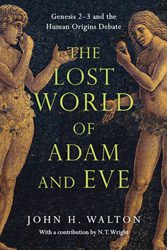 A new book on Adam and Eve and the human origins debate by Old Testament scholar John H. Walton is creating significant buzz at Patheos. We invited our Facebook followers to try and stump our scholar, by asking Dr. Walton any question related to the book they wanted.
A new book on Adam and Eve and the human origins debate by Old Testament scholar John H. Walton is creating significant buzz at Patheos. We invited our Facebook followers to try and stump our scholar, by asking Dr. Walton any question related to the book they wanted.
We received some 45 comments and questions– from the serious (“Assuming the Genesis stories are allegorical, what are the lessons we should take away from them?”) to the silly (“Did they have bellybuttons?”). For the past several weeks, Dr. Walton has been responding to selected questions from our Facebook challenge.
This week’s FB Question: Could it be possible if the tree of knowledge was placed in the garden by something greater than Yahweh? It seems illogical that he would place such a powerful object in such an easy to reach place, then tell us not to eat of it (and blatantly lie about the effects of eating the fruit) if not for the idea that its existence was totally out of his control? Could this then explain why we would have free will, not because a god willed us to have it but because the natural laws of the universe dictate it?
If we are discussing the biblical view, then there is no power greater than Yahweh. If we are not going to limit ourselves to the biblical view then I am not sure what we should include as credible. The wisdom represented in the tree of the knowledge of good and evil is not itself the source of wisdom—God is. They were to gain their wisdom from him (perhaps through the tree eventually) but only as and when they were ready for it. Gaining wisdom is best understood as a process.
God does not lie about the effects of eating the fruit—we have simply mistranslated it. Hebrew uses the expression “in the day that” not to designate a 24 hour period or before the sun goes down. It is the idiomatic way that Hebrew says “when.” More importantly, the verbal construction, sometimes translated “you will surely die” is used several other places and clearly refers to being doomed to die or sentenced to death (Note especially Jer. 26:4-11, but also Gen. 20:7; Num. 26:65; 1 Sam. 14:39, 44; 1 Kings 2:37, 42). Thus: “When you eat of it you will be doomed to die.” This is exactly what happened when God drove them from the garden and cut them off from access to the tree of life.
We have free will because God created us intentionally that way. He also created what we so easily refer to as “natural” laws, and all works under his sovereignty.
For more on The Lost World of Adam and Eve, visit the Patheos Book Club here.












